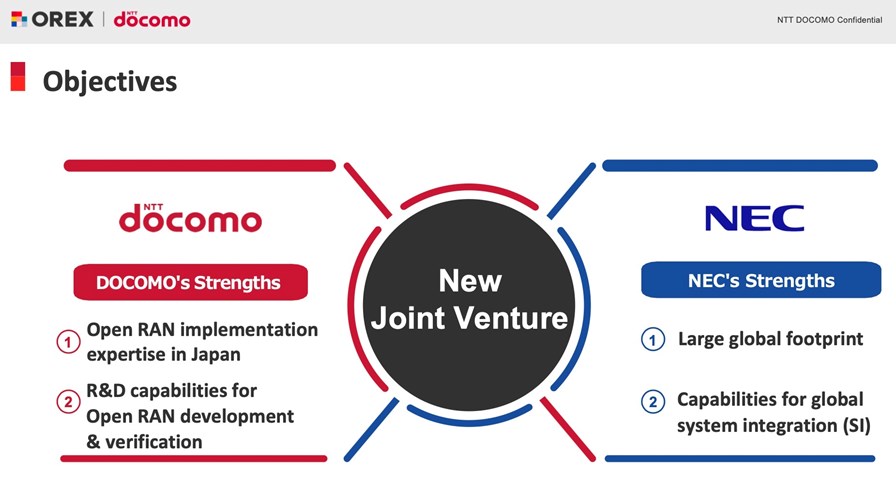
Source: NTT Docomo.
- NTT Docomo has long had plans to build an international business based on its Open RAN expertise
- It launched its Open RAN ecosystem experience (Orex) a year ago and unveiled the suite of technologies it is taking to market last September
- It has new partners and three field trials with mobile operators in Asia and the Middle East
- And now it is forming a joint venture with NEC to take Orex to the global market in a more efficient way
BARCELONA – #MWC24 – In an effort to better engage with the world’s mobile operators so it can pitch its Open RAN technology stacks, Japanese telco NTT Docomo has formed a joint venture with NEC, one of its Open RAN partners and suppliers.
NTT Docomo signalled its intent to build a commercial proposition based on its early Open RAN experience and offer it to other network operators around the world as long ago as February 2001, and has since been working with its technology partners on the proposition. A year ago it dubbed its proposition as Orex (Open RAN ecosystem experience) and in September last year unveiled its Open RAN portfolio to the global market in an effort to become a dominant force in the development of cloud-oriented next-generation mobile networks – see NTT Docomo flexes its Open RAN muscles with 5G deployment.
The basic idea is that Docomo, which was one of the founders of the O-RAN Alliance and has been developing and deploying Open RAN systems with its key partners for years already, believes other operators will ultimately deploy Open RAN-based systems too and that Docomo can help deliver the technology, systems integration skills and operating know-how gained from its Japanese deployments to those operators and save them a lot of time and challenges – all for a fat fee, of course.
Docomo has been expanding its Orex partnerships – with Amazon Web Services (AWS), chip developer Arm and semiconductor vendor Marvell the latest to join the throng – and it has three operators lined up for field trials of its Orex systems this year in the form of Singapore’s StarHub, Smart in the Philippines and Middle East telco giant Ooredoo. Docomo is also in discussions with a number of other operators about its Orex proposition, including Singtel in Singapore, KT in South Korea, and Dish Network in the US, while it continues to work closely on R&D and testing with Vodafone in Europe – see Vodafone and Docomo bang the Open RAN automation drum.
And in the meantime it has been deploying Orex technology packages in its commercial 5G network in Japan: Last year it started the ball rolling with Fujitsu’s vRAN software, Wind River’s Studio virtual infrastructure platform, accelerator and Aerial vRAN technology from Nvidia and Intel processor-based commercial off-the-shelf (COTS) servers. Now, according to the operator, it has deployed Orex packages comprising technology from a broader range of partners, including AWS, Qualcomm, Red Hat, Dell, HPE and NEC.
But taking its Orex message global is a resource-intensive challenge. Docomo has managed to engage with a number of operators but nowhere near as many as it would like and nowhere near enough to make Orex a viable business concern – it needs scale. Rival Rakuten Symphony, which was formed by Japan’s mobile service newcomer Rakuten Mobile to take its Open RAN packages (and more) to the global market, has employed thousands of staff in its efforts to develop a viable business, but Docomo doesn’t want to go down that route.
Instead it is forming an Orex joint venture (JV) with NEC, one of its partners and, it should be noted, a company in which Docomo’s parent, NTT Group, holds a 5% stake. The JV will come into effect on 1 April this year, with Docomo holding a 64% stake and NEC a 34% stake: It will be called Orex SAI.
NEC has a global presence, which it has already tried to leverage to develop its own Open RAN-based lines of business (with mixed results) – now NEC will try again with the Orex proposition.
The move obviously elevates NEC’s role in the Orex ecosystem from being just one of a number of technology partners to being the key global go-to-market partner and systems integrator. And on face value, that could create some tension as NEC is essentially being tasked with promoting and deploying technologies from some of its main rivals, such as Fujitsu.
That, though, looks like the least of the challenges for Orex. The Open RAN market has a new lease of life, in part due to the more aggressive push being made by Ericsson, which recently won a landmark Open RAN deal with AT&T. Add to the mix the fact that Nokia will want to assert itself in the market as quickly as possible and Samsung’s growing presence, and Orex SAI has some formidable competitors, including the more established Rakuten Symphony.
Docomo and NEC will need to turn those field trials into commercial deployments, and add more telco names to the list of interested parties if it is to be a long-term player in the Open RAN market which, according to forecasts from analyst house Dell’Oro Group, could be worth between $2.45bn to $3.5bn this year and between $7bn and $10.5bn in 2028.
- Ray Le Maistre, Editorial Director, TelecomTV
Email Newsletters
Sign up to receive TelecomTV's top news and videos, plus exclusive subscriber-only content direct to your inbox.




